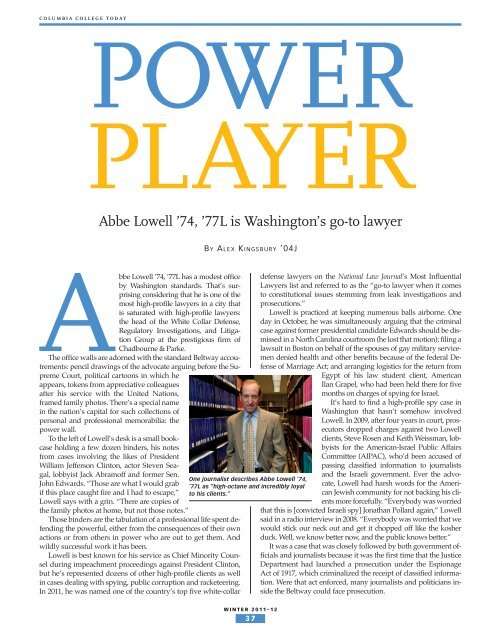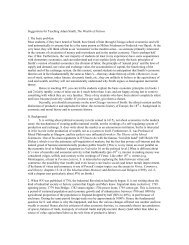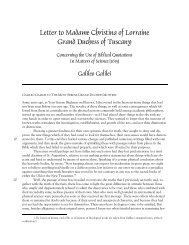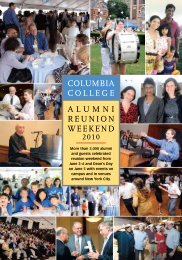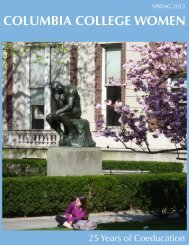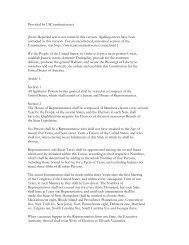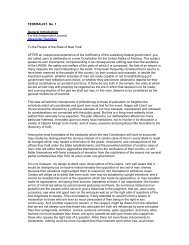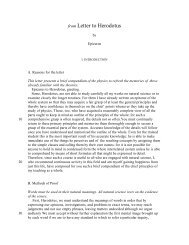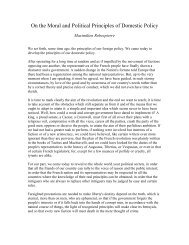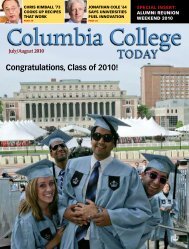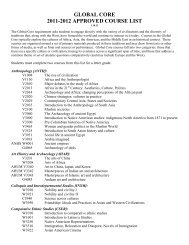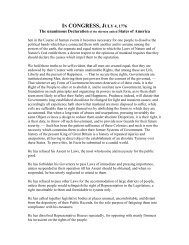Japan Storm - Columbia College - Columbia University
Japan Storm - Columbia College - Columbia University
Japan Storm - Columbia College - Columbia University
You also want an ePaper? Increase the reach of your titles
YUMPU automatically turns print PDFs into web optimized ePapers that Google loves.
POWER<br />
PLAYER<br />
COLUMBIA COLLEGE TODAY<br />
Abbe Lowell ’74, ’77L is Washington’s go-to lawyer<br />
Abbe Lowell ’74, ’77L has a modest office<br />
by Washington standards. That’s surprising<br />
con sidering that he is one of the<br />
most high-profile lawyers in a city that<br />
is saturated with high-profile lawyers:<br />
the head of the White Collar Defense,<br />
Regulatory Investigations, and Litigation<br />
Group at the prestigious firm of<br />
Chadbourne & Parke.<br />
The office walls are adorned with the standard Beltway accoutrements:<br />
pencil drawings of the advocate arguing before the Supreme<br />
Court, political cartoons in which he<br />
appears, tokens from appreciative colleagues<br />
after his service with the United Nations,<br />
framed family photos. There’s a special name<br />
in the nation’s capital for such collections of<br />
personal and professional memorabilia: the<br />
power wall.<br />
To the left of Lowell’s desk is a small bookcase<br />
holding a few dozen binders, his notes<br />
from cases involving the likes of President<br />
William Jefferson Clinton, actor Steven Sea-<br />
gal, lobbyist Jack Abramoff and former Sen.<br />
John Edwards. “Those are what I would grab<br />
if this place caught fire and I had to escape,”<br />
Lowell says with a grin. “There are copies of<br />
the family photos at home, but not those notes.”<br />
Those binders are the tabulation of a professional life spent defending<br />
the powerful, either from the consequences of their own<br />
actions or from others in power who are out to get them. And<br />
wildly successful work it has been.<br />
Lowell is best known for his service as Chief Minority Counsel<br />
during impeachment proceedings against President Clinton,<br />
but he’s represented dozens of other high-profile clients as well<br />
in cases dealing with spying, public corruption and racketeering.<br />
In 2011, he was named one of the country’s top five white-collar<br />
B y a l e x KIngsBury ’04J<br />
One journalist describes Abbe Lowell ’74,<br />
’77L as “high-octane and incredibly loyal<br />
to his clients.”<br />
WINTER 2011–12<br />
37<br />
defense lawyers on the National Law Journal’s Most Influential<br />
Lawyers list and referred to as the “go-to lawyer when it comes<br />
to constitutional issues stemming from leak investigations and<br />
prosecutions.”<br />
Lowell is practiced at keeping numerous balls airborne. One<br />
day in October, he was simultaneously arguing that the criminal<br />
case against former presidential candidate Edwards should be dismissed<br />
in a North Carolina courtroom (he lost that motion); filing a<br />
lawsuit in Boston on behalf of the spouses of gay military servicemen<br />
denied health and other benefits because of the federal Defense<br />
of Marriage Act; and arranging logistics for the return from<br />
Egypt of his law student client, American<br />
Ilan Grapel, who had been held there for five<br />
months on charges of spying for Israel.<br />
It’s hard to find a high-profile spy case in<br />
Washington that hasn’t somehow involved<br />
Lowell. In 2009, after four years in court, prosecutors<br />
dropped charges against two Lowell<br />
clients, Steve Rosen and Keith Weissman, lobbyists<br />
for the American-Israel Public Affairs<br />
Committee (AIPAC), who’d been accused of<br />
passing classified information to journalists<br />
and the Israeli government. Ever the advocate,<br />
Lowell had harsh words for the American<br />
Jewish community for not backing his clients<br />
more forcefully. “Everybody was worried<br />
that this is [convicted Israeli spy] Jonathan Pollard again,” Lowell<br />
said in a radio interview in 2008. “Everybody was worried that we<br />
would stick our neck out and get it chopped off like the kosher<br />
duck. Well, we know better now, and the public knows better.”<br />
It was a case that was closely followed by both government officials<br />
and journalists because it was the first time that the Justice<br />
Department had launched a prosecution under the Espionage<br />
Act of 1917, which criminalized the receipt of classified information.<br />
Were that act enforced, many journalists and politicians inside<br />
the Beltway could face prosecution.


